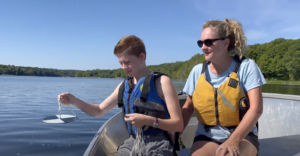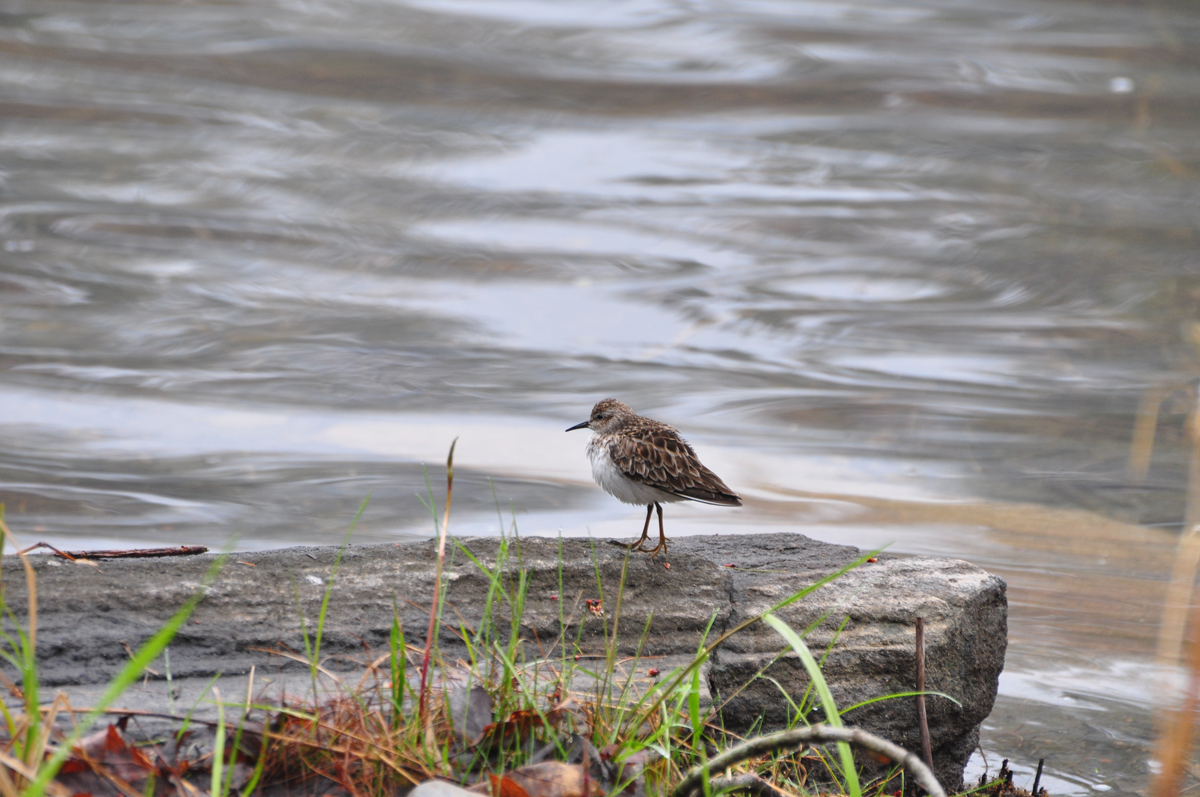ŌĆ£Not everyone can pay millions for lakefront propertyŌĆØ: This manŌĆÖs floating home is at the centre of a cottage country feud
Joe Nimen believes his shipping-container houseboat is a masterpiece. His neighbours in Port Severn say itŌĆÖs an eyesore. Now, the Ontario government is threatening to ban vessels like his from overnight stays on provincial waters

Three years ago, amateur engineer Joe Nimen got to work building his dream home: a collection of four shipping containers fashioned into a floating cottage. In NimenŌĆÖs eyes, the four-season structure┬Āis a feat of ingenuity and environmental stewardship. For his many critics in the Port Severn area, however, itŌĆÖs an unsafe eyesore with no business being on the water. At the core of the conflict is whether this dwelling qualifies as a houseboat (Nimen says it does) or whether heŌĆÖs simply exploiting a loophole to avoid zoning regulations and property taxes. The Ontario government┬Ārecently weighed in on the conflict, announcing plans to ban floating homes from overnight stays on provincial waters. Nimen says most of the relevant waterways are federal but that he appreciates the publicity boost for his company, Life on the Bay, which makes and sells vessels like his. Here, he tells us how he built a seaworthy home, why he isnŌĆÖt bothered by his critics and what he sees as the real issues in cottage country.┬Ā
LetŌĆÖs start with how you ended up living in thisŌĆ”boat? Cottage? What do you call it?
We call it a floating home, but technically itŌĆÖs a houseboat. ItŌĆÖs aways been my dream to live on the water. My parents had a cottage on Port Severn, and we would boat over in the summer. I loved the idea of a home that you could sail from Port Severn to Parry Sound or Toronto. For years, I was making plans on AutoCAD, a 3-D design software.

Do you have a background in construction?
I studied engineering and later did some work installing foundations for buildings and docks. In October 2020, my girlfriend, Erin, said she was sick of hearing me talk about the houseboat ideaŌĆöso I knew it was time to take action. We sold our house on Lake Nipissing and used that money to fund the project, with the hope that eventually we could make similar homes to sell. The house IŌĆÖm living in cost about $350,000 to make, but some of that was spent on equipment. I bought the shipping containers off Kijiji. I had to create something that could endure the winter, when the lake freezes over. It was a lot of trial error. There were nights in February when we woke up with no water because the pipes had frozen. But we got there.
For those who havenŌĆÖt seen it, can you describe your home and how it works?
Basically, itŌĆÖs two pieces, each made from two 16-metre shipping containers that sit on top of wooden barges. The first piece is our work area and garage, where we store snowmobiles, ATVs and other seasonal items. The other half is our home, plus an outdoor deck area with patio furniture and a barbecue. When we want to move, we attach the whole thing to a tugboat.

Can you park it anywhere, or are there rules?
WeŌĆÖre allowed to anchor anywhere on Crown land for up to 21 days. After that, we have to move at least 100 metres. To the best of my knowledge, most public waterwaysŌĆölakes and riversŌĆöare federally regulated.
When did you first get the floating home out on the water?
About two years ago. I remember sitting on my couch, having my coffee as we moved across the lake. I couldnŌĆÖt believe we actually did it. It was a great day, but I guess not everyone felt that way. By the following week, weŌĆÖd gotten visits from representatives of our township, the adjoining township and fire services. People were wondering,┬ĀWhat the hell is this thing?
Did you anticipate a negative reaction?
When I look back, there are some things that I should have taken into consideration. At that point, it was a work in progress, so all of the mechanics were visible from the outside. It didnŌĆÖt look like a nice finished home yetŌĆöit was more like a huge science project. I can see why people were a bit alarmed. Plus, the spot we chose was a high-traffic area. For me, it was sentimental: itŌĆÖs near an island I visited as a kid.

Do you think some cottagers might have interpreted it as you shoving your giant non-taxable flotilla in their faces?
That absolutely wasnŌĆÖt my intention, but I see how it may have come off that way.
You mentioned visits from local authorities. What did they inquire about?
I think they wanted to make sure we were following all of the rules, and to the best of my knowledge, we have been. WeŌĆÖve had two safety inspections from Transport Canada, both times with no issues. For the most part, people who take the time to come aboard tend to be pleasantly surprised. I realize that not everyone is convinced, but no one has ever said anything bad to my face.
Fair enough, but behind your back, people are saying that you have no business plopping your unregulated home in an area where you donŌĆÖt pay property taxes.
My response is that we live on a houseboat. From a categorization standpoint, itŌĆÖs the same as any other cruising boat with a washroom and a kitchen. WeŌĆÖre federally regulated by Transport Canada, we pay to keep our boat at a marina and the marina pays property taxes. And weŌĆÖre not unregulated. There is a Transport Canada building code for boats, called the Construction Standards for Small Vessels, with hundreds of rules around fire escapes, electricity, plumbing, sewage and more. We follow all of them.

IŌĆÖm glad you brought up sewage. Wastewater and other environmental concerns are key talking points among your critics.
We have our own sewage treatment plant built into our boat. ItŌĆÖs been tested and approved by Environment Canada, so IŌĆÖm pretty sure thatŌĆÖs good enough. ItŌĆÖs funny that all of these cottagers are talking about their environmental concernsŌĆöa big part of why I built this place is because I wanted what my parents had but didnŌĆÖt want to cut down trees, dig into the land, blast the rock and disturb the squirrels. WeŌĆÖve come up with a way to have all the fun of a cottage without disturbing the natural environment. So IŌĆÖm not convinced thatŌĆÖs their real motive.
Any theories about the actual source of outrage?
I think there are people who are upset that they had to spend three million dollars on their cottage and we didnŌĆÖt.
What about the eyesore factor? The mayor of Severn called your place an┬ĀŌĆ£ugly sea can.ŌĆØ
Like I said, that first summer it was a prototype. These days, it looks like most modern cottages.

Your company, Life on the Bay, sells these types of vessels. How many orders have you gotten so far?
We have five under construction, plus three that are paid for but not underway yet. Since this latest comment from the provincial government, my phone has been ringing off the hook.
YouŌĆÖre referring to a recent announcement from Doug Ford, who said heŌĆÖs banning floating homes from staying overnight on provincial waters. IsnŌĆÖt that bad for business?
I donŌĆÖt think it will be. Like I said, weŌĆÖre talking about federal waterways, so IŌĆÖm not sure that the province has any control. But, by bringing publicity to the issue, theyŌĆÖre driving traffic to our website. I should really send a thank-you note.
Who do you see as your target market?
We get a lot of interest from people who want a cottage but canŌĆÖt afford to pay two million dollars, which is what a fixer-upper in this area costs. Instead, for $700,000, you can buy a brand new three-bedroom, two-bathroom floating home. We also have even more-affordable options. Maybe youŌĆÖre downsizing after retirementŌĆöHow else could you get a home for $300,000?

IŌĆÖm not sure that bringing affordable housing to cottage country is going to help your case.
I understand that there are people who want lakefront property to be exclusive, but I donŌĆÖt think itŌĆÖs up to them. And, honestly, I think the whole situation is being exaggerated. Yes, my boat got a lot of attention, but itŌĆÖs not the out-of-control invasion some are making it out to be. If anything, whatŌĆÖs out of control is how all of the accessible shorelines up here are private propertyŌĆönot great for families who just want to spend a day on the beach. Maybe thatŌĆÖs the invasion we should be focused on. IŌĆÖm just giving people a chance to enjoy the water.







